高中英语译林牛津版模块3Unit 2 Language Task Listening and writing课件( 共32张)
文档属性
| 名称 | 高中英语译林牛津版模块3Unit 2 Language Task Listening and writing课件( 共32张) |
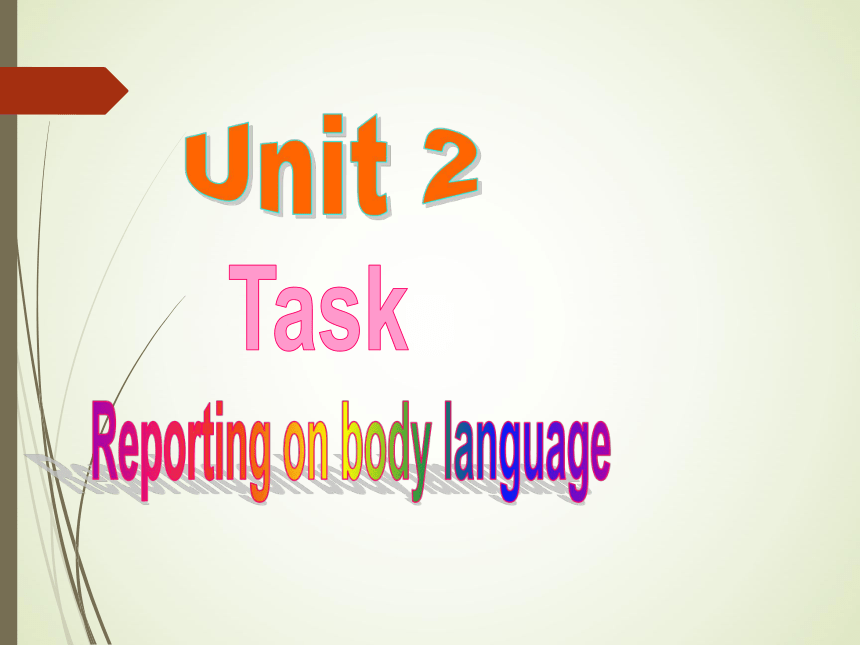
|
|
| 格式 | zip | ||
| 文件大小 | 249.8KB | ||
| 资源类型 | 教案 | ||
| 版本资源 | 牛津译林版 | ||
| 科目 | 英语 | ||
| 更新时间 | 2019-05-01 00:00:00 | ||
图片预览

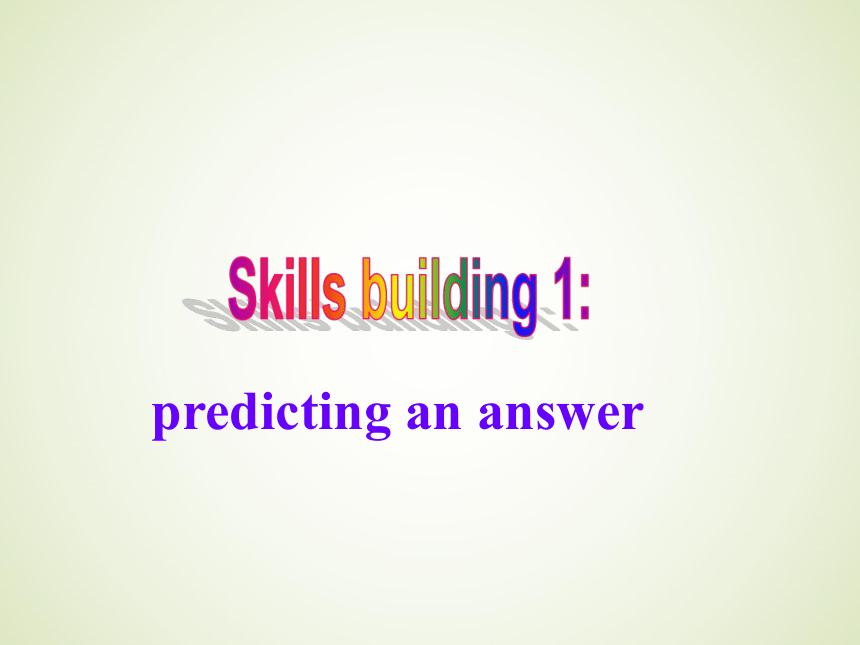

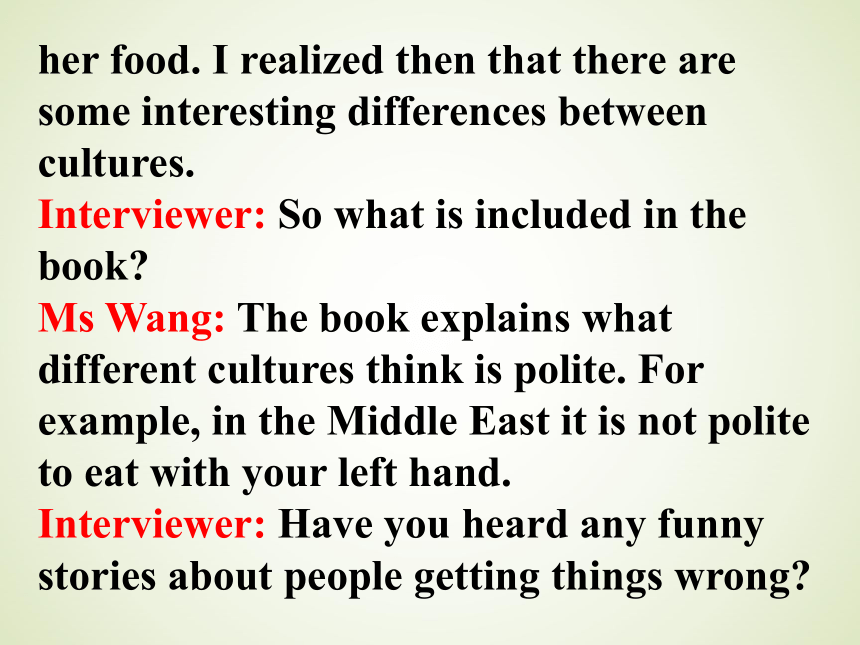
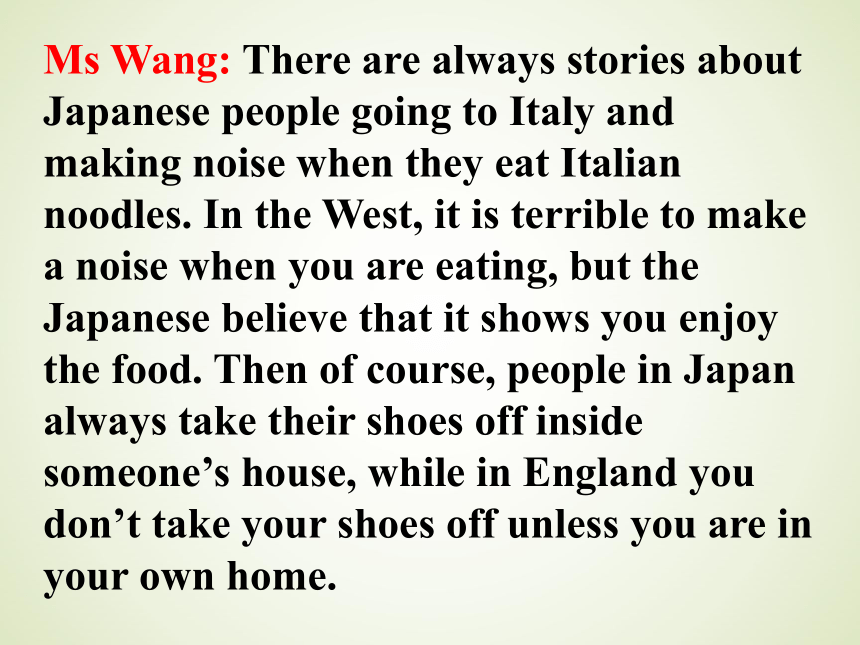


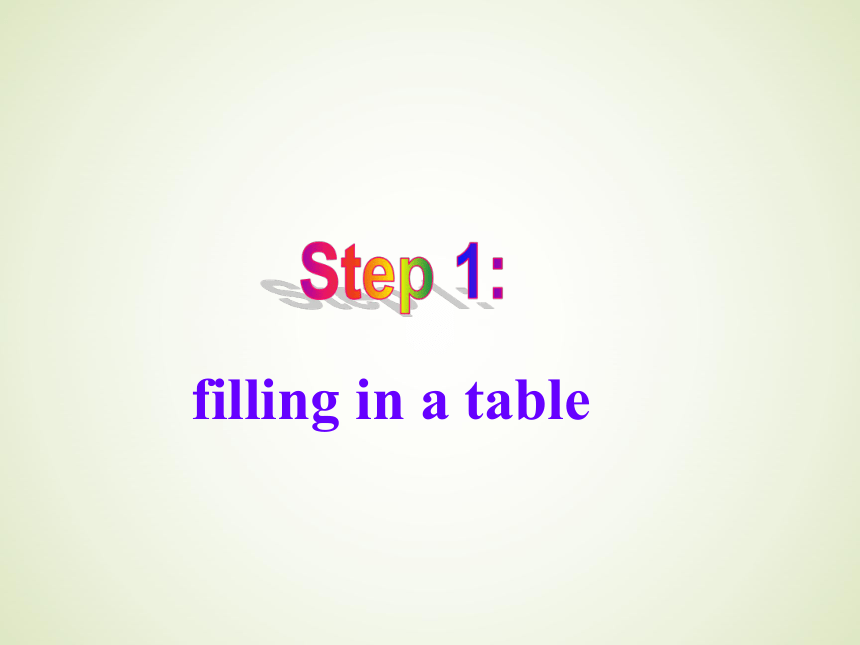
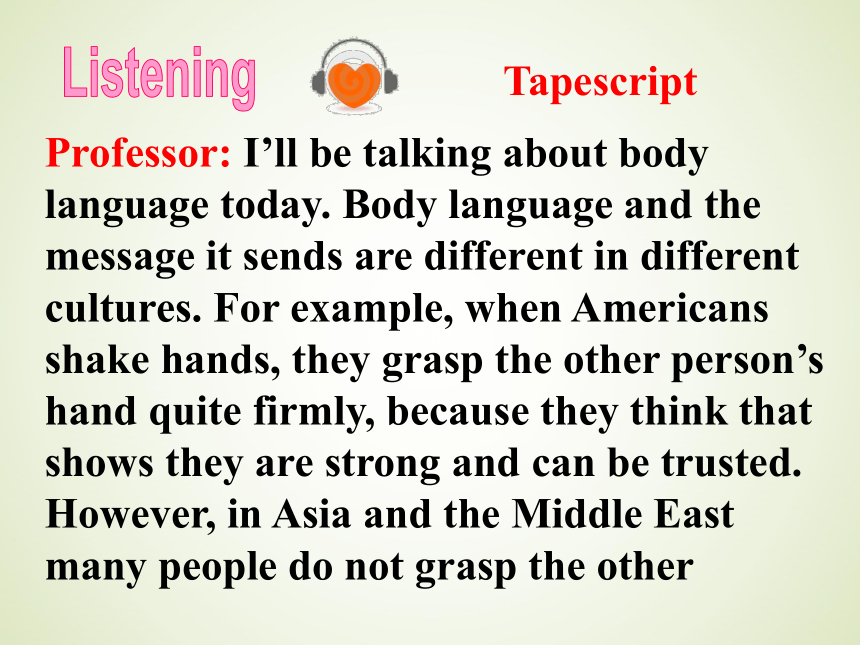



文档简介
课件32张PPT。Reporting on body languageTaskUnit 2predicting an answerSkills building 1:ListeningTapescript Interviewer: Good morning, Ms Wang. Tell us about your new book!
Ms Wang: Yes, it is a book about different cultures. I got the idea for the book when I took an American friend home to meet my mother. He didn’t try all the dishes because he didn’t want to look as if he was starving. But my mother became very upset because she thought he didn’t likeher food. I realized then that there are some interesting differences between cultures.
Interviewer: So what is included in the book?
Ms Wang: The book explains what different cultures think is polite. For example, in the Middle East it is not polite to eat with your left hand.
Interviewer: Have you heard any funny stories about people getting things wrong?Ms Wang: There are always stories about Japanese people going to Italy and making noise when they eat Italian noodles. In the West, it is terrible to make a noise when you are eating, but the Japanese believe that it shows you enjoy the food. Then of course, people in Japan always take their shoes off inside someone’s house, while in England you don’t take your shoes off unless you are in your own home.Interviewer: Does the book have advice for business people?
Ms Wang: Oh, yes. If you are late for a meeting, you should say ‘sorry’. It doesn’t matter how important you are! Another thing is that in England you can always start a conversation by talking about the weather.
Interviewer: Thank you, Ms Wang, and good luck with the book.
Ms Wang: Thank you.Answers T 2 F 3 F 4 T
5 F 6 F 7 T 8 Ffilling in a tableStep 1:ListeningTapescript Professor: I’ll be talking about body language today. Body language and the message it sends are different in different cultures. For example, when Americans shake hands, they grasp the other person’s hand quite firmly, because they think that shows they are strong and can be trusted. However, in Asia and the Middle East many people do not grasp the other person’s hand firmly, which might make an American think that they are weak and cannot be trusted.
In the same way, Americans like to look other people straight in the eye when they are talking, because to them this shows that they are telling the truth and are listening carefully. However, in parts of Asia and Africa, people might get anxious or even annoyed if you look them straight in the eye.We nod our head up and down for ‘yes’ and shake our head from side to side for ‘no’, but they mean the opposite in parts of Eastern Europe. The same for moving your hand left to right to say ‘hello’ or ‘goodbye’ — this can mean ‘no’ in Asia and parts of Europe!
In America, people point at their head or ear and move their finger in a circle to say that someone or something is crazy.However, in Argentina, this just means that you have a phone call!
So you see, body language can change from country to country. This means it is very important to ask people what they mean if you aren’t sure.Answers strong (2) trust
(3) telling the truth
(4) listening carefully
(5) yes (6) no
(7) hello (8) crazyLanguage learningWriting一、 写作要求 假设你是你班英语课代表,你班要举行英语学习经验交流会,老师要你发言。请你根据以下要点写一则英文发言稿: (1) 首先要自信; (2) 多说; (3) 多读; (4) 看英语电视节目或听英文广播。 注意: (1) 词数: 150左右。(发言稿的开头已为你写好,不计入总词数。) (2) 可根据内容要点适当增加细节,以使行文连贯。Good evening, everyone! All English learners want to improve their English, but as you know, sometimes it can be difficult! So I’d like to share my experience of learning English with you.
___________________________________
___________________________________二、写作准备 1. 搜集词汇 (1) 学习困难: difficult, difficulty, have difficulty/trouble in, hard, misunderstand, recognize, confuse, confusing, confused, puzzle, lose heart, get frustrated, give up, etc. (2) 学习策略: attitude, method, way, digest, preview, improve, a learning style, look up, refer to, turn to, believe in, learn from, etc.2. 常用句型 (1) I can’t tell the difference between the two words. (2) Would you please give me some advice on how to prepare for this kind of contest? (3) Can you tell me the best way of learning English / to learn English ? (4) I’m sorry to hear that you have trouble in speaking English. (5) It is important to take an English course, as you will be able to learn from the teachers and practice speaking English with your fellow students.(6) It should be a good idea to learn and sing English songs. (7) While waiting for a bus, I would read English newspapers. (8) As long as you keep on trying, you are sure to succeed. (9) The best way to improve your writing is to practice writing as much as you can. (10) The more you write, the more you know how to use what you’ve learned from reading and listening.3. 基础练习
(1) 有很多你可以提高英语的方法。
— There are many ways of your improving your English.
— ________________________________
__________________________ (使用主从复合句 )There are many ways (in which/ that) you can improve your English.(2) 你读得越多,记住的单词就越多。
— The more you read, the more English words you will remember.
— ________________________________
_________________ (使用主从复合句 )If you read more, you will remember more English words.(3) 如果可能的话,买一本合适的词典。
— If it is possible, buy a proper dictionary.
— ________________________________
(使用省略句 )If possible, buy a proper dictionary.(4) 当你遇到生词时,你可以查词典。
— When you meet with a new word, you can look it up in your dictionary.
— _______________________________
______________________________ (使用含有省略的状语从句的主从复合句 )When meeting with a new word, you can look it up in your dictionary.(5) 如果你能够帮我学英语我将非常感谢。
— I would be grateful to you if you could help me with my English.
— ________________________________
___________________ (使用 it作形式宾语)I would appreciate it if you could help me with my English.(6) 他学英语5年了。
— He began to learn English five years ago.
— _________________________________
_________________________ (使用主从复合句 )It is/ has been five years since he began to learn English.(7) 直到晚上10点他才记住那些单词。
— He couldn’t spell the words correctly until 10 p.m.
— ________________________________
_______________________ (使用强调句型,对时间进行强调)It was not until 10 p.m. that he could spell the words correctly.(8) 使我们失望的是,他没有通过英语考试。
— He didn’t pass / failed to pass the English test, which made us disappointed.
— _________________________________
__________________________ (使用简单句 )To our disappointment, he didn’t pass / failed to pass the English test.(9) 为了学英语,他买了一台电脑。
— He bought a computer in order that he could learn English.
— _________________________________
_________________________________
_________________________________
____________________ (使用简单句 )In order to / To learn English, he bought a computer.
He bought a computer to / in order to / so as to learn English.(10) 当他听到结果时,他感到吃惊,但是并不灰心。
— When he heard the result, he felt surprised but he didn’t lose heart.
— _________________________________
_________________________________
_________________________________
_________________________________ (使用简单句 )At the result, he felt surprised but he didn’t lose heart. /
Hearing the result, he felt surprised but he didn’t lose heart.三、书面表达范文 Good evening, everyone! All English learners want to improve their English, but as you know, sometimes it can be difficult! So I’d like to share my experience of learning English with you. First of all, you should be confident in yourself. No matter what you do, self-confidence is the first step to success. Secondly, I suggest you speak English as often as possible! There is nothing better than conversation to help you improve your English. If possible, make friends with native speakers. Besides, reading is something you can do to help you learn English on your own. You’d better have a proper dictionary, in which you can look up new words, and then try to use these new words in your conversations. So, read as much as you can and speak as often as possible. Do not just memorize spellings and grammar rules. Lastly, watching English TV programs and listening to BBC or VOA are good ways to learn English well. Not only can you learn formal English from news, but you can also learn everyday English. Believe in yourself, and you’ll succeed soon. Thank you.
Ms Wang: Yes, it is a book about different cultures. I got the idea for the book when I took an American friend home to meet my mother. He didn’t try all the dishes because he didn’t want to look as if he was starving. But my mother became very upset because she thought he didn’t likeher food. I realized then that there are some interesting differences between cultures.
Interviewer: So what is included in the book?
Ms Wang: The book explains what different cultures think is polite. For example, in the Middle East it is not polite to eat with your left hand.
Interviewer: Have you heard any funny stories about people getting things wrong?Ms Wang: There are always stories about Japanese people going to Italy and making noise when they eat Italian noodles. In the West, it is terrible to make a noise when you are eating, but the Japanese believe that it shows you enjoy the food. Then of course, people in Japan always take their shoes off inside someone’s house, while in England you don’t take your shoes off unless you are in your own home.Interviewer: Does the book have advice for business people?
Ms Wang: Oh, yes. If you are late for a meeting, you should say ‘sorry’. It doesn’t matter how important you are! Another thing is that in England you can always start a conversation by talking about the weather.
Interviewer: Thank you, Ms Wang, and good luck with the book.
Ms Wang: Thank you.Answers T 2 F 3 F 4 T
5 F 6 F 7 T 8 Ffilling in a tableStep 1:ListeningTapescript Professor: I’ll be talking about body language today. Body language and the message it sends are different in different cultures. For example, when Americans shake hands, they grasp the other person’s hand quite firmly, because they think that shows they are strong and can be trusted. However, in Asia and the Middle East many people do not grasp the other person’s hand firmly, which might make an American think that they are weak and cannot be trusted.
In the same way, Americans like to look other people straight in the eye when they are talking, because to them this shows that they are telling the truth and are listening carefully. However, in parts of Asia and Africa, people might get anxious or even annoyed if you look them straight in the eye.We nod our head up and down for ‘yes’ and shake our head from side to side for ‘no’, but they mean the opposite in parts of Eastern Europe. The same for moving your hand left to right to say ‘hello’ or ‘goodbye’ — this can mean ‘no’ in Asia and parts of Europe!
In America, people point at their head or ear and move their finger in a circle to say that someone or something is crazy.However, in Argentina, this just means that you have a phone call!
So you see, body language can change from country to country. This means it is very important to ask people what they mean if you aren’t sure.Answers strong (2) trust
(3) telling the truth
(4) listening carefully
(5) yes (6) no
(7) hello (8) crazyLanguage learningWriting一、 写作要求 假设你是你班英语课代表,你班要举行英语学习经验交流会,老师要你发言。请你根据以下要点写一则英文发言稿: (1) 首先要自信; (2) 多说; (3) 多读; (4) 看英语电视节目或听英文广播。 注意: (1) 词数: 150左右。(发言稿的开头已为你写好,不计入总词数。) (2) 可根据内容要点适当增加细节,以使行文连贯。Good evening, everyone! All English learners want to improve their English, but as you know, sometimes it can be difficult! So I’d like to share my experience of learning English with you.
___________________________________
___________________________________二、写作准备 1. 搜集词汇 (1) 学习困难: difficult, difficulty, have difficulty/trouble in, hard, misunderstand, recognize, confuse, confusing, confused, puzzle, lose heart, get frustrated, give up, etc. (2) 学习策略: attitude, method, way, digest, preview, improve, a learning style, look up, refer to, turn to, believe in, learn from, etc.2. 常用句型 (1) I can’t tell the difference between the two words. (2) Would you please give me some advice on how to prepare for this kind of contest? (3) Can you tell me the best way of learning English / to learn English ? (4) I’m sorry to hear that you have trouble in speaking English. (5) It is important to take an English course, as you will be able to learn from the teachers and practice speaking English with your fellow students.(6) It should be a good idea to learn and sing English songs. (7) While waiting for a bus, I would read English newspapers. (8) As long as you keep on trying, you are sure to succeed. (9) The best way to improve your writing is to practice writing as much as you can. (10) The more you write, the more you know how to use what you’ve learned from reading and listening.3. 基础练习
(1) 有很多你可以提高英语的方法。
— There are many ways of your improving your English.
— ________________________________
__________________________ (使用主从复合句 )There are many ways (in which/ that) you can improve your English.(2) 你读得越多,记住的单词就越多。
— The more you read, the more English words you will remember.
— ________________________________
_________________ (使用主从复合句 )If you read more, you will remember more English words.(3) 如果可能的话,买一本合适的词典。
— If it is possible, buy a proper dictionary.
— ________________________________
(使用省略句 )If possible, buy a proper dictionary.(4) 当你遇到生词时,你可以查词典。
— When you meet with a new word, you can look it up in your dictionary.
— _______________________________
______________________________ (使用含有省略的状语从句的主从复合句 )When meeting with a new word, you can look it up in your dictionary.(5) 如果你能够帮我学英语我将非常感谢。
— I would be grateful to you if you could help me with my English.
— ________________________________
___________________ (使用 it作形式宾语)I would appreciate it if you could help me with my English.(6) 他学英语5年了。
— He began to learn English five years ago.
— _________________________________
_________________________ (使用主从复合句 )It is/ has been five years since he began to learn English.(7) 直到晚上10点他才记住那些单词。
— He couldn’t spell the words correctly until 10 p.m.
— ________________________________
_______________________ (使用强调句型,对时间进行强调)It was not until 10 p.m. that he could spell the words correctly.(8) 使我们失望的是,他没有通过英语考试。
— He didn’t pass / failed to pass the English test, which made us disappointed.
— _________________________________
__________________________ (使用简单句 )To our disappointment, he didn’t pass / failed to pass the English test.(9) 为了学英语,他买了一台电脑。
— He bought a computer in order that he could learn English.
— _________________________________
_________________________________
_________________________________
____________________ (使用简单句 )In order to / To learn English, he bought a computer.
He bought a computer to / in order to / so as to learn English.(10) 当他听到结果时,他感到吃惊,但是并不灰心。
— When he heard the result, he felt surprised but he didn’t lose heart.
— _________________________________
_________________________________
_________________________________
_________________________________ (使用简单句 )At the result, he felt surprised but he didn’t lose heart. /
Hearing the result, he felt surprised but he didn’t lose heart.三、书面表达范文 Good evening, everyone! All English learners want to improve their English, but as you know, sometimes it can be difficult! So I’d like to share my experience of learning English with you. First of all, you should be confident in yourself. No matter what you do, self-confidence is the first step to success. Secondly, I suggest you speak English as often as possible! There is nothing better than conversation to help you improve your English. If possible, make friends with native speakers. Besides, reading is something you can do to help you learn English on your own. You’d better have a proper dictionary, in which you can look up new words, and then try to use these new words in your conversations. So, read as much as you can and speak as often as possible. Do not just memorize spellings and grammar rules. Lastly, watching English TV programs and listening to BBC or VOA are good ways to learn English well. Not only can you learn formal English from news, but you can also learn everyday English. Believe in yourself, and you’ll succeed soon. Thank you.
